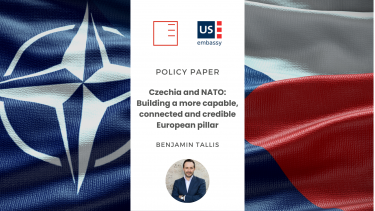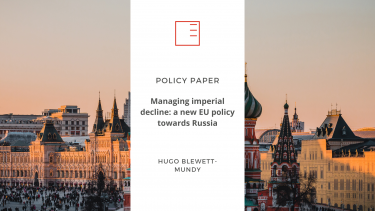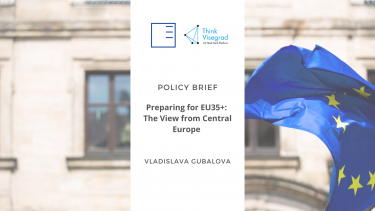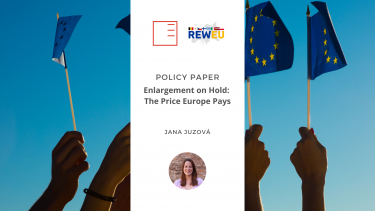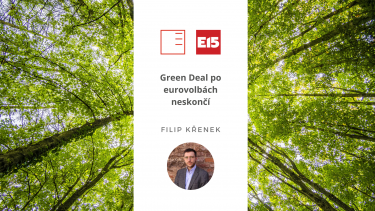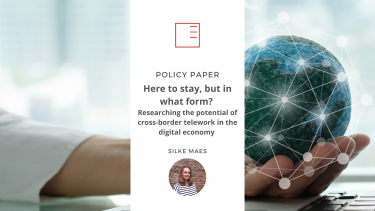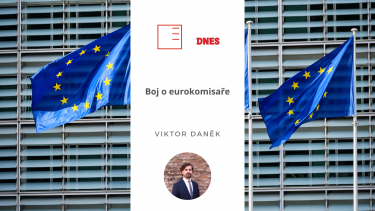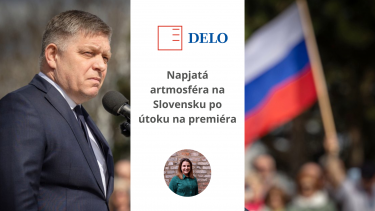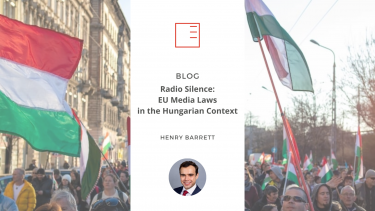Policy paper | Czechia and NATO: Building a more capable, connected and credible European pillar
CEE allies are key to building the capabilities-based, European Pillar NATO needs to enact genuine burden shifting and secure the alliance’s future. Dr Benjamin Tallis shows how Czechia can build on recent progress in defense procurement and increase its influence by prioritising the six elements Euro-NATO needs: core national war-fighting capabilities, logistics, military mobility, strategic enablers, air defence and long-range strategic strike.
Show morePolicy paper | Managing imperial decline: a new EU policy towards Russia
Russia's full-scale invasion of Ukraine in February 2022 has shattered the post-Cold War international order built upon East-West interdependence and cooperation. The European Union (EU) - which had tried to pursue a strategic relationship with Russia after the collapse of the Soviet Union in 1991 - must now adapt to the geopolitical reality of Russian neo-revisionism. Hugo Blewett-Mundy, an Associate Research Fellow at EUROPEUM Institute, identifies four areas where the EU's policy towards Russia could evolve to confront this emerging security situation in Europe.
Show morePolicy Brief | Preparing for EU35+: The View from Central Europe
Despite the historical support of EU enlargement policy by the Visegrad Four (V4), these Central European states are now faced with the challenge of reconciling their stances with the new realities of the process. As Ukraine and Moldova opened their accession negotiations, the EU seems to be torn on the questions associated with the future enlargement(s) - institutional reforms and changes within the EU budget. Transitioning from economic beneficiaries to potential contributors, the V4 states must evaluate the potential political and economic impacts of new members on both the EU and their domestic levels. Writes and proposes recommendations Vladislava Gubalova from GLOBSEC.
Show morePolicy Brief | Were Czech industrial policy interests reflected in EU 2024-2029 strategic agenda discussions?
In light of the recent return of industrial policy to the global and EU stage, this policy brief outlines how Czech interests in this policy were reflected in the debates leading up to the adoption of 2024-2029 EU strategic agenda. First, it strives to define Czech industrial policy interests, outlining two alternative approaches to how they can be perceived. The liberal approach follows the long established consensus, according to which Czechia – as a very open, export oriented economy – should promote above all a seamless Single Market and free trade. Writes EUROPEUM Institute researcher Klára Votavová in her Policy Brief.
Show morePolicy Paper | Enlargement on Hold: The Price Europe Pays
How can the EU enlargement process regain its lost momentum? And how can we learn from previous rounds of enlargement? These questions are answered by a group of authors together with EUROPEUM Institute senior researcher Jana Juzová in a new publication within the REWEU project.
Show moree15 | Green Deal will not end after the EU elections. It needs to be brought back down to earth and wrapped in more attractive paper
This weekend's European Parliament elections will strongly influence the EU agenda for almost the rest of the decade. In particular, the future fate of Green Deal is of great curiosity. After the frenetic green activity of the last five years, the political winds are turning and the appetite for tackling climate change is waning. Filip Křenek, Project Coordinator and Analyst at EUROPEUM Institute, comments on the situation for e15.
Show more
Policy paper | Here to stay, but in what form? Researching the potential of cross-border telework in the digital economy
The rapid uptake of telework, facilitated by digitalisation, has upset a system based on physical presence in the workplace in the EU. Especially since the pandemic, telework has become increasingly prevalent and an integral part of employees’ working and expectation patterns. Our research fellow Silke Maes covered this topic in her policy paper, highlighting the challenges and opportunities telework presents for cross-border coordination.
Show moreMF Dnes | Battle for the European Commissioners
With the upcoming elections, political parties are expressing their views on potential candidates for EU commissioner and their chances. Among the most frequently mentioned names are Danuše Nerudová, Jozef Síkela, and Marcel Kolaja. What experiences are most important for potential new members of the European Parliament? And is it better for them to have a narrow specialization or a broader overview? These questions are answered by Viktor Daněk, deputy director of EUROPEUM Institute, for newspaper Mladá fronta Dnes.
Show moreDelo | Tense artmosphere in Slovakia after the attack on the Prime Minister
The Slovak political scene has unified and called for calming political tensions following the attack on Prime Minister Robert Fico. However, there are concerns that the governing parties might exploit this tragedy to strengthen their power. It is necessary for political leaders to act responsibly and consider long-term consequences, commented Kristína Chlebáková, Project Manager at Institute EUROPEUM, for the Slovenian newspaper Delo.
Show moreBLOG | Radio Silence: EU Media Laws in the Hungarian Context
The European Union has passed major legislation to try and secure media freedom and independence in recent years. However, for the state of media pluralism in certain Member States, these efforts have come too late. In the Hungarian context, a pro-ruling party media ecosystem stands well-entrenched in the private and public media sector. Writes our researcher, Henry Barrett, a Fulbright-Schuman Grantee.
Show moreStaroměstské náměstí 4/1
Prague 1 - Staré Město
110 00
tel.: +420 212 246 552
email: europeum@europeum.org
https://www.europeum.org
